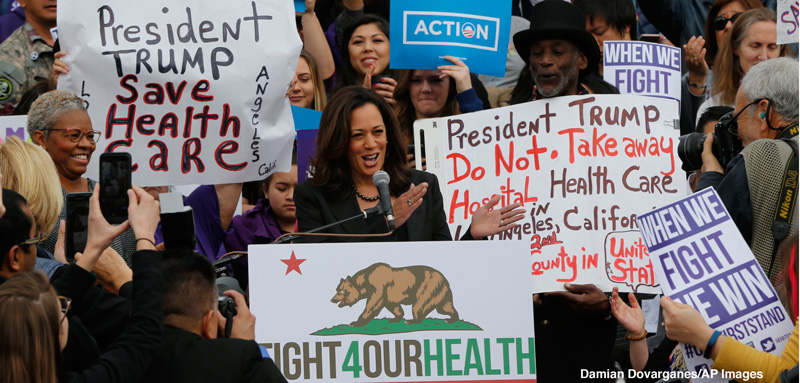- Current Events New Alabama Congressional District Selects Candidates
- Current Events Nebraska Rejects Winner-Take-All Proposal
- Citizenship Voting Under Age 18
- Citizenship Citizenship in Action
- Democratic Party Biden’s and Trump’s Recent Primary Results
- Elections Trump and Biden Win South Carolina and Michigan Primaries

The End of “Obamacare”?
One of the issues central to Donald Trump’s presidential campaign was his plan to dismantle President Obama’s Affordable Health Care Act (nicknamed “Obamacare”). Last Thursday, the Senate voted 51-48 to begin dismantling the Affordable Care Act. The following day, the House followed suit, voting 227-198 to take the first steps toward repealing the controversial legislation.
What Is “Obamacare”?
The 2010 Affordable Care Act (ACA) prevents health insurance companies from denying coverage to people with pre-existing medical conditions. It also increased funding for Medicaid, which provides coverage to the poor, and allowed children to remain on their parents’ health care plan until age 26. However, it also raised insurance premiums for many middle-class families, which made it unpopular among many Republican voters. For some people, their displeasure with the ACA was the deciding factor that pushed them toward voting for Donald Trump in the election.
Can It Be Repealed?
Now that Republicans have majority control over both the House and the Senate (as well as the White House), the dismantling efforts that Trump promised in his campaign can actually begin to start taking place. Even though Republicans have the majority, however, they don’t have enough votes to repeal the Affordable Care Act outright. Rather, they plan to take it apart piece by piece. Last week’s vote paved the way for a repeal to begin by setting up special “budget reconciliation” rules. In other words, Senate Republicans will now only need 51 votes to repeal, rather than the 60 that are usually required to move legislation. This means that they will not need the support of Senate Democrats in order to begin repealing the ACA.
What Happens Next?
Unfortunately, Congressional Republicans do not have a unified replacement plan in place yet, meaning that if the Affordable Care Act is dismantled, over 20 million Americans–many of them children, the poor, and people with pre-existing medical conditions–will soon lose their health insurance. Many Republicans have expressed concern about this, and have demanded more information about a replacement plan before they vote to repeal the Affordable Care Act. Most have also expressed the desire to keep the more popular aspects of the ACA in place (such as allowing children to remain on their parents’ health care until they are 26).
However, no clear replacement plan has been presented. Some legislators have suggested phasing out the ACA over three years–called a repeal-and-delay–rather than repealing it outright, to give Congress more time to put a new plan into place. It is likely that any new legislation put forward will also require the support of Democrats in order to pass. Meanwhile, over the weekend, demonstrators all over the country took to the streets to express their opposition to dismantling the ACA.


